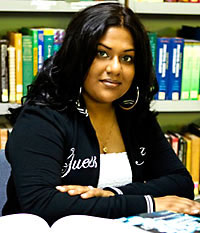Arati's Story
Arati's Story: Back to the Books 
Arati was almost forced to abandon her dream of becoming a doctor because of the excruciating pain from a condition rare among young adults - a herniated disc in her spine.
Arati was home in Northern Virginia for a semester break from medical school when her back pain became so severe she could no longer ignore it. "I woke up one morning and collapsed when I got out of bed," she said. "I couldn't walk or sit. I was comfortable only lying on my stomach."
Although Arati had experienced back pain over the years, it had progressively gotten worse during medical school. "I used to be very active, but in medical school I sit for hours and hours studying," Arati said. "Sitting is the worst position for the spine."
For several months, Arati tried different types of pain management options, such as pain relievers, muscle relaxers, anti-inflammatory medicine, acupuncture and steroid shots.
Still in agony, Arati realized she could not go back to school.
"I couldn't sit for longer than two minutes at a time, so I really had no choice," she said. "I was desperate for pain relief."
Arati went to see Amin Amini, MD, neurosurgeon, Holy Cross Hospital, and her quest for pain relief started to look brighter.
"Due to the severity of the disc herniation, and the fact that no other treatment options were helping to alleviate her pain, we decided to proceed with surgery," Dr. Amini said. "I performed a minimally invasive microdiscectomy using a surgical microscope, which is one of the latest surgical techniques used to treat herniated discs and other spinal disorders."
In the procedure, a small portion of the bone over the nerve root or disc material from under the nerve root is removed to relieve neural impingement and create more room for the nerve to heal. Because the procedure leaves nearly all of the joints, ligaments and muscles intact, it does not change the mechanical structure of the patient's spine.
Arati spent one night at Holy Cross Hospital and went back to medical school.
"I have my life back, and I am so thankful," she said. "Dr. Amini patiently answered all of my questions and thoroughly discussed all of my options - and he seemed genuinely happy to do this. When it's my turn to treat patients, I will remember how Dr. Amini cared for me -both medically and as a person."
Learn more about our neuroscience program.
This article appeared in the Winter 2010 edition of Holy Cross Health.
